Nov . 05, 2024 19:26 Back to list
expanded mesh roll factory
Exploring the World of Expanded Mesh Roll Manufacturing
In the realm of industrial materials, expanded mesh rolls stand out for their versatility and strength. This unique product is utilized across various industries, from construction to automotive applications, owing to its exceptional properties. The manufacturing of expanded mesh rolls involves intricate processes that utilize technology and skilled craftsmanship.
What is Expanded Mesh?
Expanded mesh is made from a solid sheet or metal plate that is cut and stretched to create a mesh-like structure. This material is known for its lightweight yet robust characteristics, making it an ideal choice for numerous applications. The expansion process involves cutting slits in the sheet and then stretching it to create a network of interconnected openings. This results in a durable product that retains a significant amount of its original material strength.
The Manufacturing Process
The manufacturing of expanded mesh rolls can be broken down into several key stages
1. Material Selection The first step is choosing the base material, which can be metal (often aluminum or steel), plastic, or other composite materials. The choice of material depends on the intended use of the expanded mesh, such as corrosion resistance, weight constraints, and aesthetic considerations.
2. Cutting Once the material is selected, the sheets are cut into specified dimensions. The precision of the cutting process is crucial, as it determines the size and geometry of the mesh openings.
3. Expansion The cut sheets are then fed into an expansion machine, which utilizes a series of dies and rollers to create the mesh. The expansion process not only shapes the material but also strengthens it through its unique structure.
4. Finishing Touches After expansion, the mesh may undergo various finishing processes. This could include treatments for corrosion resistance, such as galvanization or powder coating, as well as cutting into rolls or sheets of specific sizes. These finishing touches enhance the product's durability and aesthetic appeal.
5. Quality Control At this stage, rigorous quality control measures are implemented. Manufacturers conduct tests to ensure that each roll of expanded mesh meets industry standards for strength, durability, and dimensional accuracy. This step is essential, as it guarantees that the product will perform well in its intended applications.
expanded mesh roll factory

6. Packaging and Distribution Finally, the finished expanded mesh rolls are carefully packaged for distribution. Manufacturers often provide their products in bulk or cut-to-size options, catering to the diverse needs of customers.
Applications of Expanded Mesh Rolls
Expanded mesh rolls serve a variety of purposes across multiple industries
- Construction In construction, expanded mesh is used for scaffolding, trellises, and as a reinforcement material in concrete. Its ability to bear weight and its customizable design make it a popular choice for builders.
- Automotive The automotive industry employs expanded mesh for ventilation grilles and as a protective barrier for fragile components. Its lightweight nature complements the need for efficiency without compromising strength.
- Decorative Uses With its appealing aesthetics, expanded mesh is often used in architectural designs, such as façade cladding and interior design elements. Its unique look adds a modern touch to various projects.
- Industrial Applications In factories and warehouses, expanded mesh can serve as safety barriers, filters, and shelves. Its robust nature helps in maintaining safety standards while optimizing space usage.
Sustainable Manufacturing Practices
As the demand for environmentally friendly processes grows, many expanded mesh roll factories are adopting sustainable practices. This includes using recycled materials for production, implementing energy-efficient machinery, and minimizing waste during manufacturing. Such initiatives not only benefit the planet but also resonate with increasingly eco-conscious consumers.
Conclusion
The manufacturing of expanded mesh rolls is a sophisticated process that combines technology with craftsmanship. As industries continue to seek durable and versatile materials, expanded mesh rolls remain at the forefront of innovation. From construction to automotive applications, their role is crucial in improving efficiency, safety, and aesthetics. As the manufacturing sector evolves, the importance of maintaining quality and sustainability will undoubtedly shape the future of expanded mesh production.
-
Hop Dipped Galvanized/PVC Coated Temporary Fence - Anping County Xingzhi Metal Wiremesh Products Co., Ltd.|Temporary Fencing Solutions, Durable Security Products
NewsJul.30,2025
-
Hop Dipped Galvanized/PVC Coated Temporary Fence-Anping Xingzhi|Durability&Cost-Effective
NewsJul.30,2025
-
Hop-Dipped Galvanized PVC Fence - Anping Xingzhi | Durable, Quick Deployment
NewsJul.30,2025
-
Hop Dipped Galvanized/PVC Coated Temporary Fence - Anping County Xingzhi|Temporary Fencing, Durable Security, Customization
NewsJul.30,2025
-
Hop Dipped Galvanized PVC Coated Temporary Fences - Anping County Xingzhi|Durable Corrosion Resistance, Quick Installation
NewsJul.30,2025
-
Hop Dipped Galvanized / PVC Coated Temporary Fence - Anping County Xingzhi Metal Wiremesh Products Co., Ltd|Durable Temporary Fencing&Versatile Applications
NewsJul.30,2025



